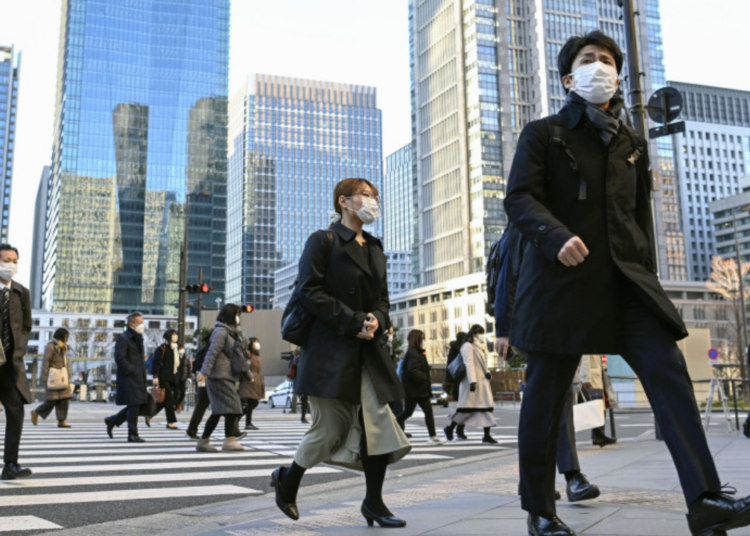Four years into the COVID-19 pandemic, more city dwellers, who entertained the idea of relocating to the countryside, may be giving it a second thought.
The spread of remote work initially made moving to rural areas from densely populated areas like Tokyo a viable option, and the Japanese capital, with a population of roughly 14 million, did see more people moving out.
But the balance between those relocating to Tokyo and those leaving it widened again last year, accelerating the capital’s population growth and potentially boding ill for the Japanese government’s goal of equalizing population flows into and out of the metropolitan area by fiscal 2027.
The change comes as people have become accustomed to “living with COVID” and the number of companies proactively encouraging remote work appears to have peaked.
Changes are coming in various aspects of everyday life. After the legal classification of COVID-19 changes in early May, the disease will be treated the same as the seasonal flu, meaning that authorities will not restrict the movement of people or urge patients to stay in hospital or quarantine. Mask-wearing, though it has never been mandatory, is now at the discretion of individuals.
The COVID-19 pandemic that began in 2020 has changed how people view relocating to rural areas. Some 25 percent of respondents in the Tokyo area expressed interest in December 2019, and the percentage rose to 34.2 percent in June 2022, according to the Cabinet Office.
“We are planning to open a restaurant in Ehime because we could enjoy a stress-free lifestyle,” said a man in his 30s in Tokyo who visited a recent event to promote relocation to the prefecture on the southwestern island of Shikoku.
Despite hopes for a reversal, recent data suggests the overconcentration of people in Tokyo and its vicinity poses a challenge, with around 30 percent of Japan’s population of 125 million living there.
A growing number of regional municipalities are stepping up their campaigns to attract people from urban areas. But some have already shifted the focus of their strategy to boosting the appeal of rural areas as second-home destinations so people can avoid the hassles of complete relocation.
The government of Yamanashi Prefecture, just west of Tokyo, is targeting people who desire a second home by offering incentives such as low-interest loans in collaboration with a regional bank. The prefecture is located at the foot of 3,776-meter Mt. Fuji, Japan’s highest mountain.
Surveys show young people tend to be more interested in moving to rural areas and those positive about leaving urban areas say they hope to cut living expenses, avoid long commutes and improve their work-life balance.
A nonprofit organization in Tokyo assisting people considering relocating to rural areas said it received over 52,000 inquiries last year, a record.
But experts say more people interested in making a move does not automatically mean the number of those actually doing so will increase.
Tokyo saw some 38,000 more people moving in than those leaving the capital in 2022, a seven-fold increase from the year before, driven largely by young people in a potential return of the pre-pandemic demographic trend. The gap came to nearly 100,000 for Tokyo and the three surrounding prefectures combined, according to government data.
The development is reminiscent of the past, when the concentration of people in Tokyo eased only temporarily, such as in the aftermath of the 2008 financial crisis.
The government of Prime Minister Fumio Kishida is counting on the spread of remote work to add impetus to flows out of the Tokyo metropolitan area and boost “relocation to rural areas without changing jobs.”
Some 31.5 percent said they were doing remote work in May 2020, around the time when Japan implemented its first COVID-19 state of emergency. The percentage fell sharply to 16.8 percent in January of 2023, according to a survey conducted by the Japan Productivity Center targeting 1,100 people.
While Japan is traditionally known for its rigid work culture, it is also notorious for its stagnant wage growth. There is also an unfilled gap in wages between urban and rural areas, with a roughly 200 yen ($1.5) difference in the minimum hourly pay between Tokyo, the highest among Japan’s 47 prefectures, and the lowest in several areas including Okinawa.
As more people experience remote work or “hybrid work” that also involves going to the office for a certain number of days, they have become aware of the convenience and other benefits of staying in urban areas, said Mitsu Inagaki, senior researcher at the Dai-ichi Life Research Institute.
“Companies have redesigned their workplaces to cater to the needs of the ‘living with COVID’ era, allowing employees to have more options in terms of how they work, which is a big change,” Inagaki said.
Due to the flexibility provided by remote work, a growing number of people choose to live in a different place for a few days or up to a month and send their children to a local daycare center or primary school during that time, Inagaki said, adding that such short-term experiences would prove useful for those moving out of the city.
“The spread of remote work has allowed people to move to a different place without changing jobs. That said, relocation is a big decision to make,” she added.
We’ve got the edge. Get real-time reports, breaking scoops, and exclusive angles delivered straight to your phone. Don’t settle for stale news. Join LEADERSHIP NEWS on WhatsApp for 24/7 updates →
Join Our WhatsApp Channel










